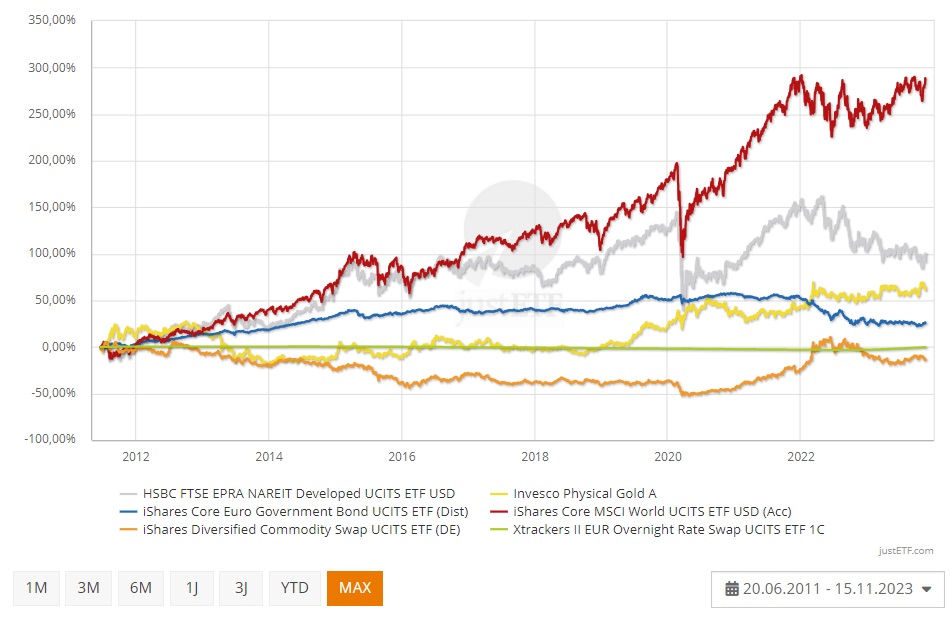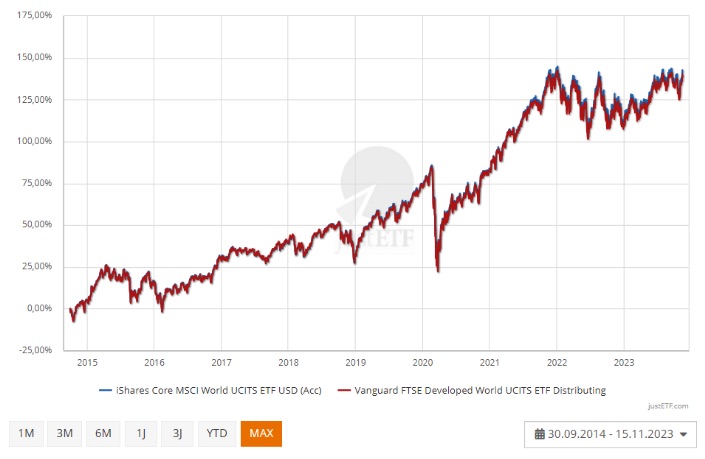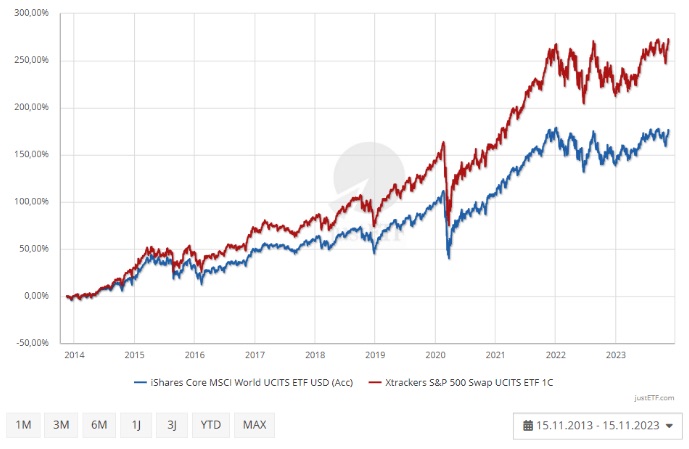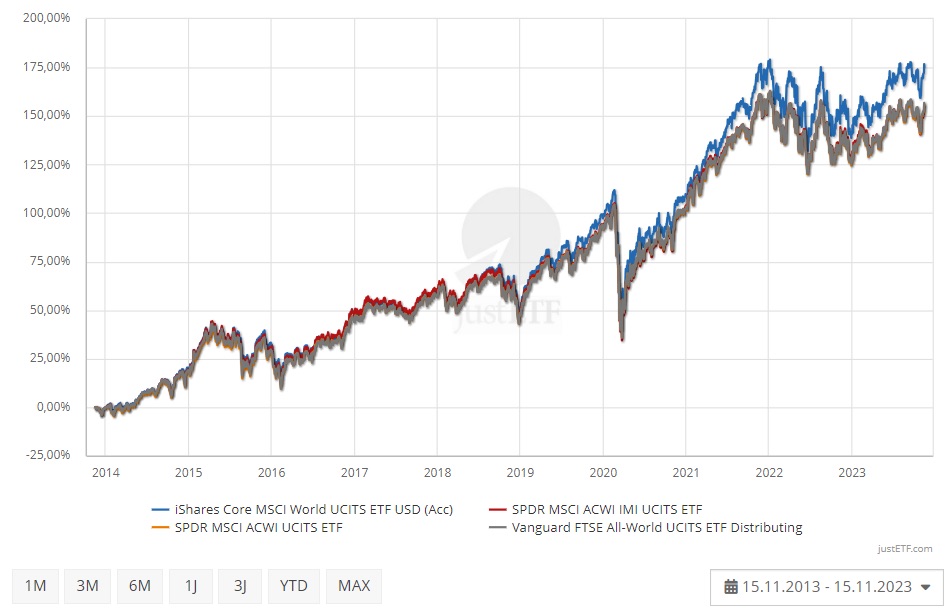
- Level: For advanced
- Reading duration: 8 minutes
What to expect in this article
Why the MSCI World is popular
In recent years, an ETF savings plan built upon MSCI World (or comparable global ETFs) has been cited by various sources as a simple and near ideal solution for asset accumulation and private pension provision. The advantages of an MSCI World ETF savings plan are clear-cut:- Low product costs
- Easy and inexpensive access via online brokers
- The ability to invest in over 1,500 companies from around the world via a single tracker fund
What is the criticism of the MSCI World about?
Of course, the MSCI World has its critics. They raise questions such as:- Hasn't the MSCI World made heavy losses recently?
- Isn't the MSCI World generally far too risky?
- Isn't it far too dependent on the US, especially on the big tech companies such as Apple, Microsoft, Google, and Meta?
- Now that interest rates are back, why should you invest your money in companies that could go up in smoke tomorrow?
Losses on the MSCI World
One criticism is that the MSCI World has allegedly suffered significant losses recently. And indeed, between mid-September and the end of October, the price of the largest MSCI World ETF actually fell by 6% – by 4% in the second half of October alone. If we look at the performance on a monthly basis, we can see that the MSCI World posted a negative return for three consecutive months from August: -1% in August, -1.8% in September and even -3.1% in October. However, fluctuations of this magnitude are nothing unusual in the stock market, and are even fairly moderate for an equity ETF. Zoom out a little more, and we can see that, in November, the MSCI World bounced back +6.3% – more than making up for the losses of the previous three months.
![MSCI World monthly returns in a heatmap]()
![MSCI World ETFs]()
MSCI World monthly returns in a heatmap

Source: justETF Research, 14 November 2023
Overall, the MSCI World’s 2023 performance is not bad at all. Since the beginning of the year, the price has risen by around 15% (as of 23 November 2023). Even during the last low on 29 October, MSCI World ETFs were still up by around 7%. Current MSCI World losses are therefore far less dramatic than suggested, and not at all unusual for a stock market investment. In fact, MSCI World ETF investors have achieved a higher return this year than investors in cash.
How MSCI World ETFs have performed in 2023

Source: justETF Research, 14 November 2023; all MSCI World ETFs with a 5+ years track record
The MSCI World is too risky
The positive performance of MSCI World ETFs comes into sharper focus over longer timeframes ( using the largest MSCI World ETF as an indicator)::
![MSCI World returns at a glance]()
![Asset class returns compared]()
MSCI World returns at a glance

Source: justETF Research, 22 November 2023
As our table shows, the last few years have been very pleasing for MSCI World investors, and 2023 is no exception. Only 2022 was characterised by losses: around -13% due to the outbreak of war in Ukraine, inflation, and interest rate hikes.
This observation leads us to the question of whether the MSCI World is too risky? Perhaps a better question to ask is: : Is the MSCI World too risky for me? The answer to this question is highly subjective and is discussed in detail in our article How much risk should you take?
Essentially, if you want to park your money in the short term without losing value, then a savings account or money money ETF is the better choice. In contrast, an equity investment should always be invested for the long-term - ideally at least ten years. That way you canride out the short-term losses that can occur at any time. So long as you don’t sell when stocks are down, then you should be able to reap the rewards that are the upside of equity risk. You can find more information on this topic in our article Share risk simply explained.
If you have a sufficiently long investment horizon then broadly diversified global indices such as the MSCI World are an excellent choice. Historically, equities have delivered the highest returns of any asset class over the medium and long term.
Asset class returns compared

MSCI World EU Government Bonds Gold Commodities Real Estate ETF Money Market ETF
Source: justETF Research, 14 November 2023
The MSCI World is not diversified enough
However, some take aim at the MSCI World for its composition rather than its performance. It is said that the index is not broad enough, that it’s over-concentrated in US stocks. This is an old chestnut that comes up from time to time, so let’s take a closer look.
The MSCI World index contains around 1,500 companies. By comparison, the Dax only contains 40 companies, while the S&P 500 contains 500. Investors in individual shares are likely to be less diversified still.
Incidentally, the sheer number of stocks included in a portfolio only offers a limited indication of its diversification potential – especially if the investment is spread across several hundred companies from all sectors, as with the MSCI World.
This becomes clear when comparing the MSCI World with the FTSE Developed Index, which also tracks companies from advanced countries worldwide. The FTSE Developed Index contains around 600 more companies than the MSCI World (2,118 vs. 1,511 at the end of October). But the performance of the two indices is almost identical. That’s because the additional companies in the FTSE Developed only account for a very small proportion of the index's return.
At a certain point, increasing the number of stocks makes little difference. For this reason, the performance of an index can also usually be replicated using sampling instead of laboriously holding every last security regardless of cost.
![Virtually identical: MSCI World vs FTSE Developed World]()
Virtually identical: MSCI World vs FTSE Developed World

MSCI World FTSE Developed World
Source: justETF Research, 15 November 2023
The regions and sectors covered by an ETF are another significant diversification factor. Although the name "World" suggests otherwise, the MSCI World "only" includes 23 developed countries, including Canada, Australia, Singapore, and Israel. Important emerging markets such as China, India, and Brazil are not represented.The MSCI World is too dependent on the USA
US companies currently account for around 70 per cent of the MSCI World. That is actually quite a lot. The reason is that US companies have performed very well in recent years, especially the tech sector giants such as Apple, Microsoft, and Amazon. US corporate dominance over the past decade means that American firms now hold every single one of the MSCI World’s top 10 positions.
![MSCI World positions]()
![1 year MSCI World vs S&P 500]()
![10 years MSCI World vs S&P 500]()
The MSCI World top 10 stocks

Source: justETF Research, 15 November 2023
The dominance of the US market is particularly striking when we compare the performance of the MSCI World with the S&P 500 over the last 12 months.
1 year MSCI World vs S&P 500

MSCI World S&P 500
Source: justETF Research, 14 November 2023
Although there is still a clear correlation over a 10-year period, the difference makes more sense when you consider that US stocks were much less heavily weighted in the MSCI World ten years ago.
10 years MSCI World vs S&P 500

MSCI World S&P 500
Source: justETF Research, 14 November 2023
The influence of US stocks upon the MSCI World cannot be denied. However, there’s a good reason for this. US companies, not only play a major role in the MSCI World, but also in the real global economy. Ultimately, their weighting in indices such as the MSCI World is due to the value that investors attribute to these companies.
The MSCI World is designed to capture the performance of the world’s most valuable companies and that’s why US firms dominate. Meanwhile, the impact of the US upon global financial markets can also be detected by movements in non-US indices such as the DAX in response to US inflation and interest rate decisions.
Moreover, multinational mega-caps such as Apple and Co. operate globally. Herefore they’re less dependent on the US economy than companies that rely exclusively on American sales. Ultimately, you are still investing globally via the big US firms. Finally, the tech stocks have gained around 40% so far in 2023, and have thus contributed significantly to the positive performance of the MSCI World.Alternatives to the MSCI World
If you’d like to invest in emerging market companies or want to reduce the US share of your portfolio, then try truly global ETFs that track the MSCI All Country World (ACWI) or the FTSE All World, for example. Despite their global outlook, these indices have not actually performed significantly differently from the MSCI World. This is because the emerging market share of both the MSCI ACWI and the FTSE All World is only around 10%. Once again, this only reflects the reality of the financial markets, as both indices weight companies according to their market capitalisation.
MSCI World MSCI ACWI MSCI ACWI IMI FTSE All World
Source: justETF Research, 14 November 2023
In recent years, the emerging markets have trailed developed world stocks, which is why the MSCI ACWI and FTSE All-World have performed slightly worse than MSCI World and FTSE Developed ETFs.
If diversification is your aim, then you can push it further with the MSCI ACWI IMI. This index not only tracks large and medium-sized companies, but also those with a small market capitalisation (so-called small caps). This index contains over 9,000 stocks in total. However, as previously discussed above, the additional stocks only make a marginal difference due to their relatively small size.
If you want to weight developing economies more heavily in your portfolio (despite the recent weaker performance), you can do so by investing in an emerging markets ETF in addition to the MSCI World. For example, you could try a MSCI Emerging Markets ETF. Most practitioners aim for a maximum emerging market allocation of 5-20%. An alternative approach is to weight your portfolio by the gross domestic product (GDP) of the different regions instead of market capitalisation. However, this approach can lead to a weight of up to 40% in emerging markets which is a very big call.
Our ETF strategy planner is a great starting point to help you devise your ideal asset allocation.
















